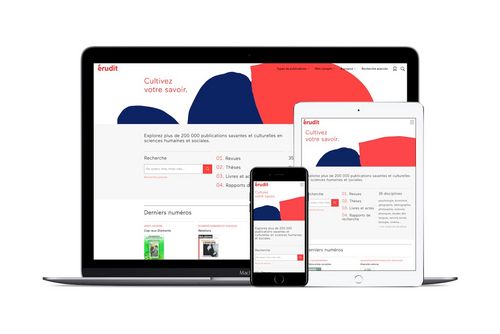Tanja Niemann, General Manager of the Érudit platform
Credit: Erudite
As a result of the master’s work in information science carried out at the University of Montreal by Guillain Beaudry, who noticed the inaccessibility of scientific journals in Quebec remotely, Erudite has come a long way. “The production project was the origin of Érudit and the distribution component was added to meet the great need. Today, the Érudit Institute is a research infrastructure,” sums up Tanja Niemann, its General Director.
Evolving role
Born at the beginning of the web, Érudit was the first platform to put five magazines online from the Presses de l’Université de Montréal, which has supported the project since its beginnings. But it’s not just about putting text online, we’re ensuring that the formats are indexable and machine-readable. “We feel prepared for the future, with the solid foundations and vision that were established 25 years ago,” says Tanja Niemann.
“Given this interest, there was the idea of sharing the tool with other journals and other universities,” says Gwendal Henry, communications consultant at Erudite. In 2004, a consortium was formed between UdeM, Université Laval and the University of Quebec in Montreal to support the production of research journals in Quebec. The platform will continue to develop and the fourth version will be launched in 2017. He points out that “the technological environment is changing and we must continue to improve for better reference and better accessibility.” Every year, 10,000 new articles and histories are added to Érudit.
In addition, Erudite has been recognized by the Canadian Foundation for Innovation as one of 19 major Canadian infrastructure projects. “This is essential because in the humanities, the text becomes the object of research,” explains Tanja Niemann. In collaboration with partners, Érudit has created a collection of texts that can be explored via Calcul Québec.
Local flag in local language
Without Erudite’s support, many small journals run by a handful of research professors could barely survive. By making room for these publications, which often operate in silos, Erudite mobilizes university libraries and other stakeholders to “stabilize and bring sustainability to this work around journals,” says Tanja Neiman.
Érudit therefore has an essential function as an anchor point in the ecosystem of scientific communication in French. Because the disappearance of these French-speaking journals will inevitably have repercussions on research topics. The director points out that “major international magazines are not necessarily concerned with local issues.” The team behind Érudit, which has gained a unique and strong experience, provides daily support to the magazines, as well as to the users of the platform. “Journals benefit from our infrastructure and services, and don’t need to reinvent the wheel individually,” she recalls.
Trusted and free content
By centralizing content and service delivery to francophone journals, Erudite plays a key role in the world of humanities and social sciences research. “The content comes from journals that are the core of French-language science. We amplify everything,” says Tanja Niemann.
“Our mission is to promote local research,” she stresses. Érudit’s content is read and watched all over the world: 75% of browsing is done by foreign Internet users. Without barriers and easily downloadable even for those without access to modern equipment or a fast connection, the content is available to both professionals and beginners. “People find a reliable source of information,” says Gwendal Henry. During the pandemic, the platform was able to notice that the questions that were at the heart of discussions were reflected in its ranking of the most read articles.
Scientifically and for the sake of society
In the context of a major change in the economic model of subscriptions, Erodet is relying on open access. Its source code is open and 97% of the hosted scripts can be viewed for free. About 3% of the content can be accessed by subscription from libraries: “This allows payments to be made back to journals so they can, for example, pay their graphic designer or editorial secretary,” says the consultant.
Researchers also do not pay to publish in journals on Érudit. “This is not applicable in the humanities and social sciences,” says Tanya Neiman. Therefore, it is the close cooperation between university libraries that allows the financing and maintenance of this model. This is the big difference with commercial publishers, who make profits from research produced with public funds, in journals that are often run by researchers on a voluntary basis. “The aim is to circulate public funds to reward journal teams appropriately so that they can produce high-quality journals and train,” sums up Gwendal Henry.
Keep playing your part
Around the world, similar platforms play an important role; By bringing together these initiatives, independent open access publications will become stronger. In addition to its tireless battle to produce content in French, Erudite is today Canada’s national platform for journals in the humanities and social sciences. It will therefore host magazines from all over Canada, whether French-speaking, anglophone or bilingual. “There is an urgent need in English Canada as well,” posits Tanya Neiman.
To reverse the balance of power with commercial publishers, the Erudite team wants universities to better understand the importance of local journals serving as a vehicle for science. “These magazines bring communities to life; we must encourage these publications in French,” concludes Gwendal Henry.
To know more

“Hardcore beer fanatic. Falls down a lot. Professional coffee fan. Music ninja.”







More Stories
SALES / PHOTO SALES – Nikon D850 “5 Star” Bare Body Photo Body at €2,539.00
Discovering a new turning point under the Antarctic ice sheet! What are the consequences?
Record number for an insect!